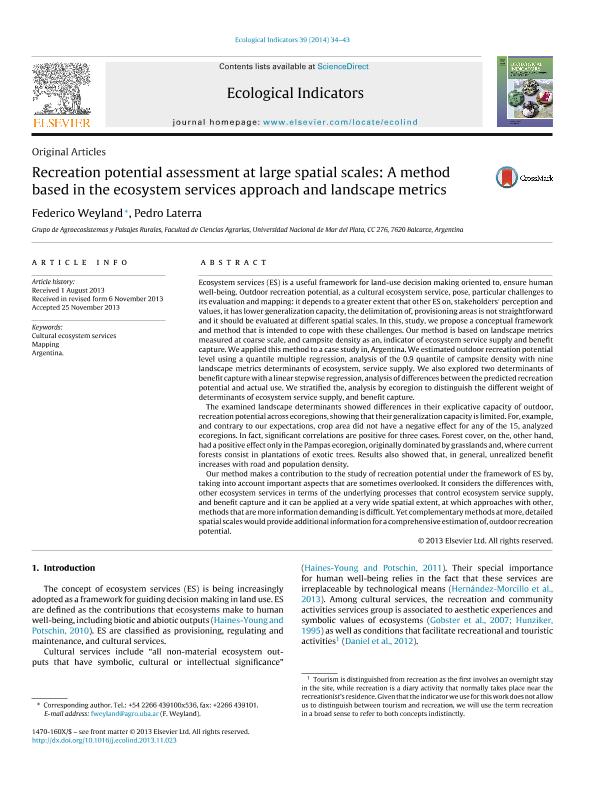Mostrar el registro sencillo del ítem
dc.contributor.author
Weyland, Federico

dc.contributor.author
Laterra, Pedro

dc.date.available
2018-01-25T14:53:20Z
dc.date.issued
2014-04
dc.identifier.citation
Weyland, Federico; Laterra, Pedro; Recreation potential assessment at large spatial scales: A method based in the ecosystem services approach and landscape metrics; Elsevier Science; Ecological Indicators; 39; 4-2014; 34-43
dc.identifier.issn
1470-160X
dc.identifier.uri
http://hdl.handle.net/11336/34580
dc.description.abstract
Ecosystem services (ES) is a useful framework for land-use decision making oriented to, ensure human well-being. Outdoor recreation potential, as a cultural ecosystem service, pose, particular challenges to its evaluation and mapping: it depends to a greater extent that other ES on, stakeholderś perception and values, it has lower generalization capacity, the delimitation of, provisioning areas is not straightforward and it should be evaluated at different spatial scales. In this, study, we propose a conceptual framework and method that is intended to cope with these challenges. Our method is based on landscape metrics measured at coarse scale, and campsite density as an, indicator of ecosystem service supply and benefit capture. We applied this method to a case study in, Argentina. We estimated outdoor recreation potential level using a quantile multiple regression, analysis of the 0.9 quantile of campsite density with nine landscape metrics determinants of ecosystem, service supply. We also explored two determinants of benefit capture with a linear stepwise regression, analysis of differences between the predicted recreation potential and actual use. We stratified the, analysis by ecoregion to distinguish the different weight of determinants of ecosystem service supply, and benefit capture. The examined landscape determinants showed differences in their explicative capacity of outdoor, recreation potential across ecoregions, showing that their generalization capacity is limited. For, example, and contrary to our expectations, crop area did not have a negative effect for any of the 15, analyzed ecoregions. In fact, significant correlations are positive for three cases. Forest cover, on the, other hand, had a positive effect only in the Pampas ecoregion, originally dominated by grasslands and, where current forests consist in plantations of exotic trees. Results also showed that, in general, unrealized benefit increases with road and population density. Our method makes a contribution to the study of recreation potential under the framework of ES by, taking into account important aspects that are sometimes overlooked. It considers the differences with, other ecosystem services in terms of the underlying processes that control ecosystem service supply, and benefit capture and it can be applied at a very wide spatial extent, at which approaches with other, methods that are more information demanding is difficult. Yet complementary methods at more, detailed spatial scales would provide additional information for a comprehensive estimation of, outdoor recreation potential.
dc.format
application/pdf
dc.language.iso
eng
dc.publisher
Elsevier Science

dc.rights
info:eu-repo/semantics/openAccess
dc.rights.uri
https://creativecommons.org/licenses/by-nc-nd/2.5/ar/
dc.subject
Cultural Ecosystem Services
dc.subject
Mapping
dc.subject
Argentina
dc.subject.classification
Otras Ciencias Biológicas

dc.subject.classification
Ciencias Biológicas

dc.subject.classification
CIENCIAS NATURALES Y EXACTAS

dc.title
Recreation potential assessment at large spatial scales: A method based in the ecosystem services approach and landscape metrics
dc.type
info:eu-repo/semantics/article
dc.type
info:ar-repo/semantics/artículo
dc.type
info:eu-repo/semantics/publishedVersion
dc.date.updated
2018-01-24T14:52:44Z
dc.journal.volume
39
dc.journal.pagination
34-43
dc.journal.pais
Países Bajos

dc.journal.ciudad
Amsterdam
dc.description.fil
Fil: Weyland, Federico. Consejo Nacional de Investigaciones Científicas y Técnicas; Argentina. Universidad Nacional de Mar del Plata. Facultad de Ciencias Agrarias; Argentina
dc.description.fil
Fil: Laterra, Pedro. Consejo Nacional de Investigaciones Científicas y Técnicas; Argentina. Universidad Nacional de Mar del Plata. Facultad de Ciencias Agrarias; Argentina
dc.journal.title
Ecological Indicators

dc.relation.alternativeid
info:eu-repo/semantics/altIdentifier/doi/http://dx.doi.org/10.1016/j.ecolind.2013.11.023
dc.relation.alternativeid
info:eu-repo/semantics/altIdentifier/url/https://www.sciencedirect.com/science/article/pii/S1470160X13004883
Archivos asociados
